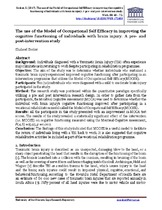The use of the Model of Occupational Self Efficacy in improving the cognitive functioning of individuals with brain injury: A pre- and post-intervention study
Abstract
BACKGROUND: Individuals diagnosed with a Traumatic Brain Injury (TBI) often experience major limitations in returning to work despite participating in rehabilitation programmes.
OBJECTIVE: The aim of the study was to determine whether individuals who sustained a traumatic brain injury experienced improved cognitive functioning after participating in an intervention programme that utilizes the Model of Occupational Self-Efficacy (MOOSE).
PARTICIPANTS: Ten (10) individuals who were diagnosed with a mild to moderate brain injury participated in the study.
METHOD: The research study was positioned within the quantitative paradigm specifically utilizing a pre and post intervention research design. In order to gather data from the participants, the Montreal Cognitive Assessment (MOCA) was used to determine whether the individual with brain injury’s cognitive functioning improved after participating in a vocational rehabilitation model called the Model of Occupational Self Efficacy (MOOSE).
RESULTS: All the participants in this study presented with an improvement in MOCA test scores. The results of the study revealed a statistically significant effect of the intervention (i.e. MOOSE) on cognitive functioning measured using the Montreal Cognitive Assessment, F(4, 6) = 15.95, p = 0.002.
CONCLUSION: The findings of this study indicated that MOOSE is a useful model to facilitate the return of individuals living with a TBI back to work. It is also suggested that cognitive rehabilitative activities be included as part of the vocational rehabilitation programme.

